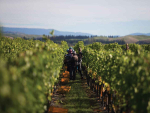Next Generation Viticulture: Capture more light to harvest more grapes
Transforming canopy management systems to maximise sunlight could increase vineyard profitability without compromising wine quality, says researchers.
Lucie Jiraska clearly recalls her first taste of wine, unimpressed by her grandpa’s Cabernet Moravia.
Now she’s working with Auckland University’s Biological Sciences department studying the effect of management on soil biodiversity in Hawke’s Bay and Marlborough vineyards.
What drew you to studying soil in New Zealand vineyards?
I was five when my grandpa, a hobby winemaker from the south of the Czech Republic, thought it was about time for me to have my first sip of wine. I vividly remember him being so proud of that batch. The cold of the cellar was seeping through my summer clothes, as he ceremonially withdraw the wine from one of the barrels and I was presented with a tiny glass containing less than a sip of dark ruby liquid. My grandma was strongly arguing against it, but my grandpa was adamant. I took a sip, my face twisted into a forced smile, and I thought, what is this adult madness and why is everyone pretending they like it? I did not want to hurt my grandpa’s feelings, so I pretended I liked the wine as well, but for a long time after, I kept wondering what the wine industry was all about.
It took me another 15 years, and moving to Prague for my bachelor’s and master’s degree in molecular biology and microbiology, to actually start understanding the science behind fermentation, microbes and soils. From there, it was just a small step, supported by a portion of luck, to join the Vineyard Ecosystems (VE) Programme. I was looking for a PhD project right when my current PhD supervisors Professor Matthew Goddard and Dr Sarah Knight were advertising a position. I did not really have to think twice, and I am very happy that I made this decision to join it.
What has your research involved?
My research mostly focuses on the impact of agricultural management on soil microbial communities in vineyards from the Hawke’s Bay and Marlborough regions. I specifically researched how soil microbial communities differ between vineyards using synthetic herbicides and those with alternative undervine management, like cultivation or mowing. I also focused on direct impacts of synthetic and organic fungicides on soil microbes and changes to their functions in response to the application of fungicides.
As a microbial ecologist, I get to go out in the field to collect samples. Samples for the VE Programme were mostly collected by our colleagues at Plant & Food Research in Hawke’s Bay and Marlborough, but for other aligned projects I was collecting samples of soil, bark, fruit and/or leaves. While I enjoy being outdoors and sampling, a large part of my work is in the laboratory doing either DNA or RNA extractions from samples or using molecular techniques to understand what microbial communities live in our samples. Or I’m in front of a computer bioinformatically processing and statistically analysing the data. This is what I think the most exciting part is, as this is the step where the data begins to make sense and we can start answering our research questions
Who has helped you in your work?
Besides my amazing supervisors, Mat Goddard and Sarah Knight, I would like to acknowledge Beatrix Jones, Victoria Raw, Innocenter Amima, Jed Lennox, Paulina Giraldo-Perez and Soon Lee. And obviously all the winegrowers that allowed us to collect soils and access their sites for so many years!
What are some of the findings in your thesis?
The soil communities between vineyards are highly variable, more than between management regimes. While we found a small but significant effect of management regime on soil microbial composition, we are still in the process of understanding if these small differences do affect their function in the vineyard. Each vineyard seems to be a microbiome soil island where the history of the site is reflected in the soil community.
And while some of the synthetic fungicides we tested directly in the lab had no impact on the soil microbial community composition, we were able to find an impact on microbial function in these soils. Especially those that had a history of repeated exposure to pesticides. These findings suggest that soils do in fact have an “ecological memory”, so what you put in your soils matters, as it may influence how your vineyard responds in the future. However, at this stage we still have a very limited understanding on how it mechanistically works, as soils are extremely complex systems to study. Maybe one day we will be able to design management plans suited for each vineyard, not just generalised guidelines to follow.

OPINION: Sauvignon Blanc was famously introduced to New Zealand by Ross Spence of Matua Valley, and then serendipitously planted in…

OPINION: As New Zealand's wine industry grapples with figurative dark clouds (and literal for some wine regions of late) this…
Fifteen premium Marlborough wineries have found a home away from home in the region, with a shared cellar door in…
The large 2025 harvest will exacerbate the wine industry's "lingering" supply from recent vintages, New Zealand Winegrowers Chief Executive Philip…
Marlborough grape growers Will and Jayne Grigg are "cautiously optimistic" about the future of the region's wine industry.